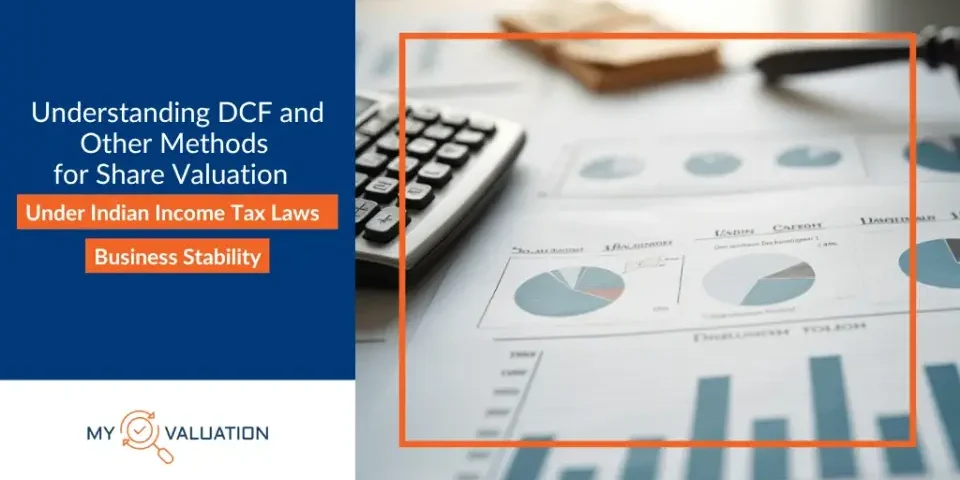When it comes to valuation under Income Tax Act in India, choosing the right methodology can make or change your compliance strategy. The Discounted Cash Flow (DCF) method stands as one of the most useful approaches for share valuation, but it's not the only game in town.
Whether you're a startup founder navigating your first ESOP issuance or a CFO preparing for a major transaction, understanding these valuation methods is important for staying compliant with Indian tax regulations. At My Valuation, we've helped hundreds of companies across the startup and early-stage tech industry manage these complex requirements with precision.
What is DCF Valuation Under Indian Income Tax Laws?
The Discounted Cash Flow (DCF) method is a fundamental valuation technique that calculates a company's worth based on its projected future cash flows, discounted back to present value. Under Indian Income Tax regulations, this method is particularly relevant for various scenarios including share transfers, ESOP valuations, and capital gains calculations.
DCF valuation involves projecting a company's free cash flows over a specific period (typically 5-10 years) and applying a discount rate that reflects the risk associated with those cash flows. The terminal value is then calculated and discounted back to arrive at the enterprise value.
For Indian tax purposes, the DCF method must align with specific guidelines outlined in Income Tax Act valuation requirements, guaranteeing that assumptions are reasonable and defensible before tax authorities.
When is Share Valuation Required Under Income Tax Act?
Transfer of Unlisted Shares
Any transfer of unlisted shares requires proper valuation to determine capital gains. The fair market valuation of business becomes highly important for calculating the taxable amount accurately.
ESOP Transactions
When employees exercise stock options, the difference between exercise price and fair market value determines the perquisite value. ESOP valuation services offer compliance with tax regulations while protecting both company and employee interests.
Share-based Payments
Companies issuing shares below market value must account for the difference as income. Proper startup valuation services India help determine the correct market value for tax purposes.
Gift or Below Market Transfers
Transfers below fair market value produce deemed income provisions, making accurate valuation important for tax planning.
Key Valuation Methods Accepted Under Indian Tax Laws
1. Discounted Cash Flow (DCF) Method
When to Use: Best advised for profitable companies with predictable cash flows and established business models.
Key Components:
- Free cash flow projections (5-10 years)
- Terminal value calculation
- Adjusted Average Cost of Capital (WACC)
- Risk adjustments specific to Indian markets
Advantages: Provides real value based on company fundamentals and future earning potential.
Limitations: Highly sensitive to assumptions about growth rates and discount rates.
2. Comparable Company Analysis (Trading Multiples)
This method values shares based on multiples received from similar listed companies. Common multiples include P/E, EV/EBITDA, and P/B ratios.
Best For: Companies operating in sectors with adequate comparable listed entities.
Process: Identify comparable companies, calculate relevant multiples, apply appropriate discounts for size and liquidity differences.
3. Precedent Transaction Method
Values shares based on multiples from recent transactions of similar companies in the same industry.
Applicability: Particularly useful for early-stage business valuation where limited trading comparable exist.
Considerations: Transaction premiums and specific deal circumstances must be carefully analyzed.
4. Asset-Based Approach
Focuses on the company's net asset value, either on a book value or liquidation basis.
Suitable For: Asset-heavy businesses or distressed situations where assumptions going concern may not apply.
5. Market Approach Methods
Recent Transaction Price
If shares have been transacted recently under arm's length conditions, this provides strong evidence of fair value.
Net Asset Value (NAV)
Particularly relevant for investment holding companies or asset management businesses.
DCF Implementation: Step-by-Step Guide for Indian Companies
Step 1: Financial Projections
Build detailed financial modeling and projections covering:
- Revenue growth assumptions based on market analysis
- Operating margin evolution
- Capital expenditure requirements
- Working capital changes
Step 2: Calculate Free Cash Flows
Free Cash Flow = EBIT × (1 - Tax Rate) + Depreciation - CapEx - Change in Working Capital
Step 3: Determine Discount Rate (WACC)
- Risk-free rate (Government bond yields)
- Market risk premium
- Company-specific beta
- Cost of debt
- Capital structure optimization
Step 4: Terminal Value Calculation
Choose between:
- Perpetual growth method
- Exit multiple method
Step 5: Sensitivity Analysis
Test various scenarios to understand valuation ranges and key value indicators.
Regulatory Framework: Key Compliance Considerations
Income Tax Rules 11U and 11UA
These rules specify valuation requirements for different types of transactions and acceptable methodologies.
Documentation Requirements
Maintain accurate records, including:
- Valuation methodology selection explanation
- Key assumptions and their basis
- Market data sources
- Expert opinions where applicable
IBBI Registered Valuer Requirements
For certain transactions, IBBI registered valuer services may be mandatory, particularly for larger transactions or specific regulatory scenarios.
Comparative Analysis: When to Choose Which Method
| Method | Best Use Case | Reliability | Complexity | Time Required |
|---|---|---|---|---|
| DCF | Stable, profitable companies | High | High | 3-4 weeks |
| Trading Multiples | Companies with good comparables | Medium | Medium | 1-2 weeks |
| Transaction Multiples | Recent industry activity | Medium | Medium | 2-3 weeks |
| Asset-Based | Asset-heavy/distressed | Low-Medium | Low | 1-2 weeks |
| Recent Transaction | Arm's length recent deals | High | Low | 1 week |
Common Challenges and Solutions in Indian Context
Challenge 1: Limited Comparable Data
Solution: Use cross-industry multiples with appropriate adjustments or tap more heavily on DCF methodology.
Challenge 2: Regulatory Uncertainty
Solution: Work with experienced registered valuer for startups who understand evolving regulatory landscape.
Challenge 3: Market Volatility Impact
Solution: Use multiple scenarios and valuation date considerations to account for market conditions.
Challenge 4: Complex Ownership Structures
Solution: Careful analysis of rights, preferences, and liquidation waterfalls, particularly relevant for startup funding valuation.
Real-World Application: Startup ESOP Valuation Case Study
Consider a Series A startup issuing ESOPs:
Background: Technology startup, 2 years old, recent Series A funding at ₹100 crore valuation.
Valuation Approach:
- Recent Transaction Method: Series A price provides baseline
- DCF Validation: 5-year projections showing path to profitability
- Discount Application: 20-30% discount for minority stake and lack of marketability
Result: ESOP fair value established at ₹85-90 crore enterprise value range, guaranteeing tax compliance while remaining attractive for employees.
Best Practices for Tax-Compliant Share Valuation
Document Everything
Maintain detailed records of methodology selection, assumptions, and supporting data for potential tax study.
Use Multiple Methods
Where possible, divide value using 2-3 different approaches to demonstrate reasonableness.
Regular Updates
Conduct periodic valuations to track changes in business fundamentals and market conditions.
Professional Expertise
Engage qualified professionals for valuation under Income Tax Act to guarantee compliance and defensibility.
Technology and Tools for Efficient Valuation
Financial Modeling Software
Advanced Excel models with scenario analysis capabilities streamline the DCF process.
Market Data Platforms
Access to reliable comparable company data and transaction databases improves accuracy.
Valuation Management Systems
Systematic approach to managing multiple valuations and tracking changes over time.
Future Trends in Indian Share Valuation
Increased Regulatory Analysis
Tax authorities are becoming more sophisticated in valuation analysis, requiring higher quality documentation.
Technology Integration
AI and machine learning tools are beginning to improve traditional valuation methodologies.
International Unity
Indian practices are increasingly aligning with international valuation standards.
How My Valuation Can Help Your Business?
As specialists in startup valuation services India and complete business valuation services India, we understand the unique challenges facing growing companies. Our team of IBBI registered valuers brings deep expertise in:
- 409A valuation India compliance for stock option plans
- ESOP valuation services specific to startup needs
- Complex valuation under FEMA and valuation under SEBI guidelines
- Pre-funding startup valuation for fundraising preparation
Whether you need a one-time valuation for compliance or ongoing virtual CFO services India to manage your financial strategy, our experienced team provides reliable, defensible valuations that stand up to regulatory analysis.
Ready to prove your share valuations are tax-compliant and investor-ready? Contact our valuation experts for a consultation related to your specific needs.




